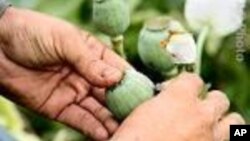According to the United Nations Office on Drugs and Crime, Afghanistan will produce more than eight-thousand tons of opium this year, a one-third increase over 2006. “When there is violence, guerrillas, insurgency -- all that creates a climate of lawlessness -- the rule of law breaks down”, said Office on Drugs and Crime director Antonio Maria Costa. In the case of Afghanistan, he said, “opium cultivation tends to flourish.”
Over one-hundred-ninety thousand hectares have been turned to opium production, mostly in southern and eastern Afghanistan and particularly in Helmand province, where Taleban insurgents operate. But the U-N report also points out that twice as many provinces in northern and central Afghanistan are free of opium poppy cultivation. U.S. State Department deputy spokesman Tom Casey commented:
“What we’ve seen is a real two-tiered kind of system, when it comes to poppy cultivation. In those places where there is security that’s been provided and where there is development assistance going in a meaningful way, you have decreased poppy cultivation. And in fact, it is twice the number of provinces, from six last year to thirteen this year in 2007, out of thirty-four provinces total that are poppy free. So there is real positive change occurring.”
Mr. Casey said there is a link between insecurity and the increase in opium poppy production:
“The numbers are going up exactly in those places where you would expect them to. They are the places where there is greatest insecurity, where there is greatest activity on the part of the Taleban and other violent elements and where the government [of Afghanistan] has not yet been able to deal with those very basic security problems, and, therefore, has also limited our ability to provide for economic development, including alternative development programs for the people in those areas.”
Afghanistan’s President Hamid Karzai said his country has a problem with illegal drugs:
“Afghanistan is committed to fighting it because this evil is first hurting us, and then youth in the rest of the world. We are committed. It will take time.”
U.S. Ambassador to Afghanistan Bill Wood says “illicit narcotics are a cancer” that must be cut out. The U.S., he says, is “committed to a much more robust effort this year” to help Afghanistan combat drug traffickers. .




